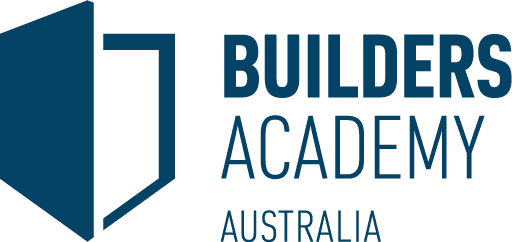Foundation skills & EAL
Build your English confidence for life with Builders Academy Australia.
Why do an EAL or foundations course?
Prepare for career and training success with the communication skills you need to thrive in the classroom and the work site.
Our English as an Additional Language (EAL) and Foundation Skills programs are designed for students who require further skills development to prepare for the workforce or vocational training pathways.
Learn in a welcoming and inclusive environment
Nationally recognised qualifications
Complete a course in just 14-16 weeks part-time

Read the success stories of our building legends
MEET OUR GRADUATES
MEET JASON - Certificate III in Carpentry
We caught up with Apprentice of the Year Nominee, Jason working onsite at the beach in Altona.
Watch moreMEET OMAR - DIPLOMA OF BUILDING AND CONSTRUCTION (BUILDING)
Omar honed his skills and increased his self-confidence to run his own business.
Watch moreMEET ANDREJS - Certificate III in Carpentry
After 10 years in the AFL, Andrejs decided to try a trade and pursued his interest in carpentry.
Watch more

Frequently asked questions

What English language skills will I study?
Our English as an Additional Language (EAL) curriculum is carefully designed to facilitate your smooth transition into an English-speaking workplace. The course in EAL places an emphasis on the development of all core aspects of language skills — reading, writing, speaking, and listening. These are not isolated modules; they’re intertwined, reinforcing each other to give you a holistic language learning experience.
The language learning objectives will see you engage in reading and writing exercises that are tailored to mimic real-world professional situations. We also have speaking and listening modules, which focus on equipping you with the skills to articulate your thoughts clearly and understand spoken English in various contexts — such as team meetings, client interactions, and informal workplace communications, where you will need to be able to communicate basic personal details, short basic messages, and understand simple and familiar directions.
But language skills are not the only focus. The course also ensures you are prepared for the dynamics of the Australian workplace. To this end, we include modules that build your understanding of workplace safety norms and introduce you to the nuances of Australian work culture.
In essence, our courses aim to build your language proficiency while also ensuring you’re comfortable and confident in navigating the unique landscape of the Australian workplace. This dual focus is what sets our EAL curriculum apart.
Below, find a more specific breakdown of what you will learn in each of our EAL and Foundation Skills courses.
Certificate II in EAL (Employment)
Our Certificate II in EAL (Employment) will improve your employability skills and help you access work opportunities.
After completing this course, you will have developed relevant knowledge in:
- Speaking and writing skills
- Numeracy skills
- English language education
Certificate III in EAL (Employment)
Our Certificate III in EAL (Employment) is perfect for students learning English as an Additional Language. This course will equip you with the knowledge and skills needed to enter the workforce.
Throughout the course, you will:
- Practise writing and reading straightforward information
- Enhance your literacy and numeracy skills
- Use critical and creative thinking skills
- Build good workplace relationships
- Take part in casual conversations
- Use computers for workplace information
Certificate II in Skills for Work and Vocational Pathways
With the many things you’ll study in this course, it will equip you with the employability skills and knowledge aligned to the Australian Core Skills Framework (ACSF):
- Oral communication skills
- Digital technology skills
- Numeracy and learning skills
Once you successfully complete the course, you will be able to:
- Solve routine workplace problems
- Use routine strategies
- Respond to routine workplace information
- Calculate routine metric measurements
- Read and write complex workplace texts
- Create effective workplace presentations

Is the course nationally recognised?
Builders Academy Australia is a Registered Training Organisation (RTO), meaning our courses adhere to the high-quality standards set out by the Australian Skills Quality Authority. The EAL and foundation skills courses fall under this umbrella and are therefore nationally recognised.
Our accreditation under the Australian Qualifications Framework (AQF) assures the legitimacy and value of your qualifications. This recognition boosts your employability and opens doors for further academic pursuits. It also ensures that the skills you learn with us are aligned with the industry requirements, making you a valuable asset to potential employers.

What is the duration of EAL and Foundation Skills courses?
We understand that every student has a unique set of circumstances, commitments, and learning pace. Our EAL and foundation skills courses are therefore structured to accommodate this diversity. The courses are part-time and designed to run for 14 to 16 weeks, with two sessions per week of facilitator-led classes.
We aim to strike a balance between offering ample learning time and ensuring the course remains manageable for students juggling other commitments. This flexible structure allows you to fully engage in the learning process without feeling overwhelmed, and without having to put other aspects of your life on hold while you learn.

What types of career pathways are available?
The purpose of the EAL and foundation skills courses is not just to help you communicate effectively in English but also to facilitate your career advancement. On completing these courses, you’ll be well-equipped to progress towards higher-level qualifications in your chosen industry.
These courses serve as your launchpad into various industries. They provide you with the basic language skills and understanding of workplace culture required to succeed in an Australian work environment. Furthermore, you can leverage the skills and confidence you gain through these courses to pursue further studies or to apply directly for job opportunities.
For example, those who study the Certificate II or III in EAL (Employment) have several further study career pathways open to them. These include:
- CPC20220 Certificate II in Construction Pathways
- CPC30220 Certificate III in Carpentry
- CPC30620 Certificate III in Painting and Decorating
- CPC31320 Certificate III in Wall and Floor Tiling
- CPC31420 Certificate III in Construction Waterproofing
- CPC33020 – Certificate III in Bricklaying and Blocklaying
Similarly, the career pathways available to those who complete the Certificate II in Skills for Work and Vocational Pathways include:
- CPC20220 Certificate II in Construction Pathways
- CPC30220 Certificate III in Carpentry
- CPC30620 Certificate III in Painting and Decorating
- CPC31320 Certificate III in Wall and Floor Tiling
- CPC31420 Certificate III in Construction Waterproofing
- CPC33020 – Certificate III in Bricklaying and Blocklaying

Should I do a Certificate II or a Certificate III?
The choice between Certificate II and Certificate III often depends on your current language proficiency and your future aspirations.
If you’re just beginning your language learning journey or if you want to solidify your basic English communication skills, Certificate II is a suitable choice.
If you’ve already got a handle on basic English and are looking to push your language skills even further, Certificate III would be more fitting. This level goes beyond just the basics and introduces you to more complex language structures. You’ll also learn how to use critical and creative thinking in English, skills that can enhance your communication and problem-solving abilities in the workplace.

How will I be assessed in these courses
Assessment in our EAL English language and foundation skills courses is as much about evaluating your progress as it is about reinforcing your learning. You’ll be required to complete a variety of units of competency that consist of core and elective units.
These assessments are crafted to measure your comprehension of the course material and your ability to apply the skills learned. They are designed to be comprehensive and provide a practical demonstration of your skills.

What is the cost of EAL & Foundation Skills Training courses?
Our EAL training and Foundation Skills programs are full fee-paying courses.
It’s important to remember that investing in these courses is a significant step towards advancing your career. The exact cost can vary based on several factors, and we recommend reaching out to our team for specific details.

What payment options do you have available?
We have a number of payment options available.
We believe in making quality education accessible, which includes offering a range of flexible payment options. These options can vary based on factors such as your eligibility and your current residence (the state you are living in). Some students may be eligible for government-subsidised courses or loan schemes.
For more detailed information, we recommend viewing our full list of fees and various payment options available.

What is the difference between English as a Second Language (ESL) and English as an Additional Language (EAL)?
While both terms refer to language learning programs for individuals learning English language skills, there is a slight difference.
ESL (English second language course) typically refers to learners for whom English is their second language.
In contrast, EAL is a broader term that encompasses individuals who may speak multiple languages, and English is an additional language they are learning. The term EAL recognises the multilingual abilities of our students, making it a more inclusive term.

Let us help you find the right course
Request a callback to chat with our friendly
team about your study options.





